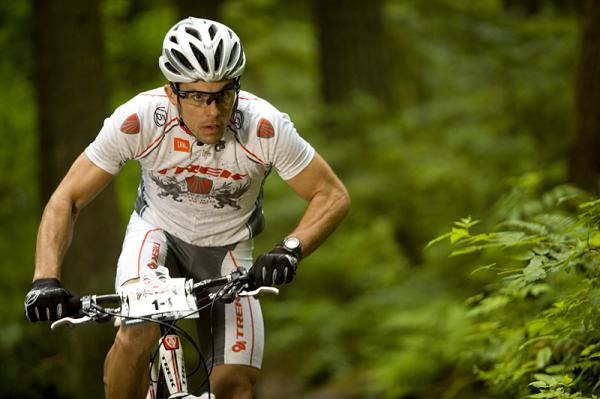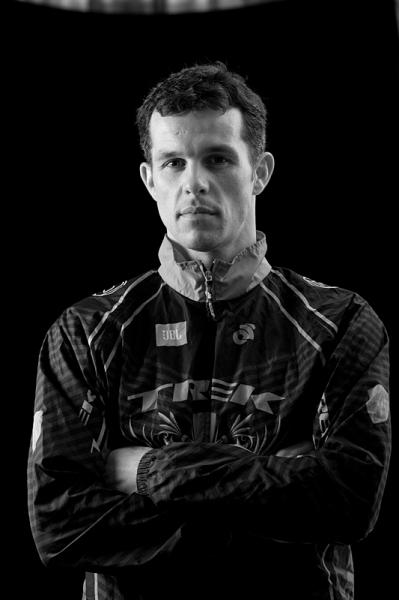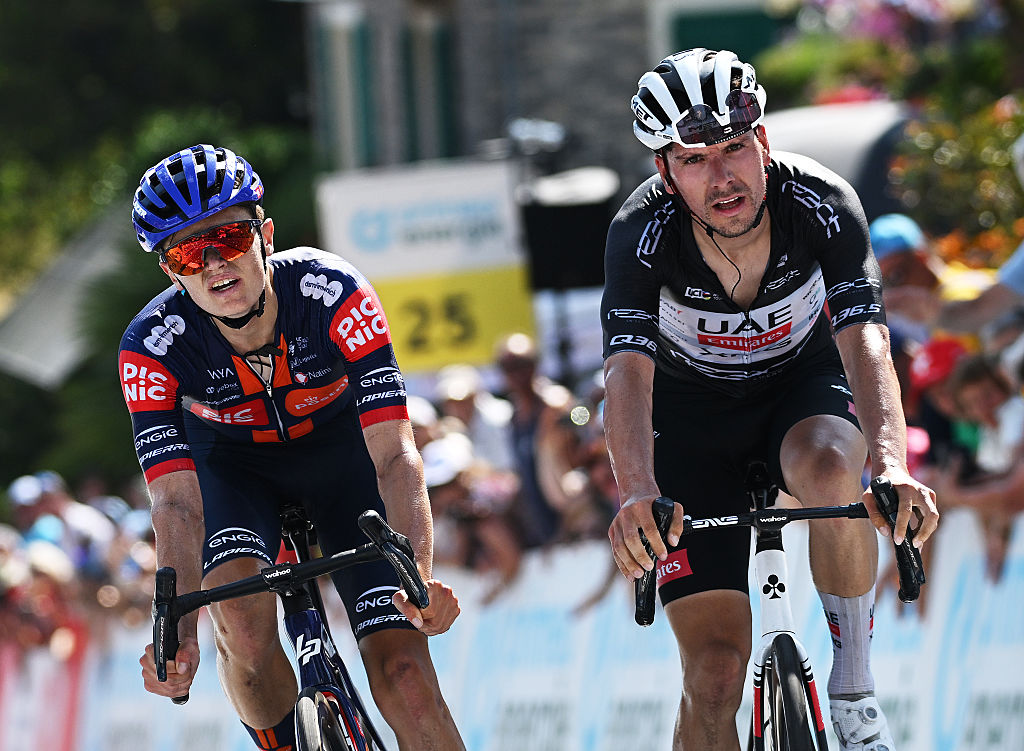Too tough: Chris Eatough wraps up storied career
US Mountain bike legend retires to life of service
The latest race content, interviews, features, reviews and expert buying guides, direct to your inbox!
You are now subscribed
Your newsletter sign-up was successful


Endurance mountain biker Chris Eatough won six 24-hour solo world titles and five US 24-hour national championships during his career. Known for his meticulous approach to and execution of race logistics and strategy, Eatough made a name for himself in 24-hour solo races, but he also competed regularly in 100-miler mountain bike races and off-road stage races. Cyclingnews' Mountain Bike Editor Sue George spoke with Eatough after he announced his retirement last month.
Things don't always go according to plan, and Chris Eatough was reminded of that after being forced to withdraw from what was to be his swansong race just hours before it began. Eatough had planned to say goodbye to a long and successful pro mountain biking career at the 24 hours of Moab – also the 24-hour US National Championships - in mid-October in Utah, but the flu kept him on the sidelines.
"Moab was always going to be a big race for me this season because it was nationals, plus it's a big race," said the 35-year-old Eatough. "I always had it on my schedule. I knew this was going to be my closing season and it seemed like the right time to wrap up."
"I'm disappointed. I would have liked to go out racing rather than not racing. I think about it a lot, and I would have loved to be out there battling against Josh (Tostado) and Kelley (Magelky) - seems like they had a good race."
Time to pull the plug
Eatough, who in September celebrated the birth of his second child, pulled the plug on professional racing for several reasons.
"First, I've been racing pro for 11 or 12 years, depending how you count them. That's a long career for a pro mountain biker.
The latest race content, interviews, features, reviews and expert buying guides, direct to your inbox!
"Another reason is family. I have a growing family with two kids. It's difficult to maintain a full travel and training schedule while having a family."
"I'm not complaining," he said. "I'm one of the lucky ones - having been able to earn a small salary from Trek. We kept it going for a few years after our daughter [his first child – ed.]. It's not as easy with the second kid."
Maybe if pro mountain bikers were paid more Eatough could have stayed in the sport a little longer – his family's finances and logistics played a role in his decision. "Maybe you can sustain a career better as a pro in the European road peloton?" he speculated. "Some of them can send more money home, and their wives can stay home and take care of the kids."
"There's not a whole lot of money in mountain biking. I didn't make so much money that my wife could be home with the kids," said Eatough who noted the challenge of finding child care for two children when he was travelling or squeezing in countless hours of endurance training.
"Even when I was home, it was hard to train for enough hours. It's a huge commitment."
Life after full-time racing
Eatough is following three paths in his retirement. Primarily he is working full time as a bike transportation advocate for BikeArlington.com, but he also works for himself as a mountain bike coach and is product testing for his long-time sponsor, Trek Bicycles.
"I've gotten involved in bike commuting. I took a job with the County of Arlington, and I'm their bike program manager. I'm promoting bicycling for commuting and running errands. It's a progressive area. We're trying to make it a showcase area for bike commuting - kind of like Portland, Oregon. We manage transportation demand and promote ride sharing, biking to work, telecommuting, compressed work weeks, buses, etc."
The job connects Eatough's passion for bikes with his educational background. "My Master's degree is in transportation. It comes into play though what I do is not so much engineering, I'm more on the marketing and encouragement and education side. I'm running events and reaching out to businesses to be bike-friendly so they can have a place to park bikes and showers. We're working with school systems to get biking and courses into the PE [physical education] curriculum."
"I've been lucky enough to find a unique job that connects my skills and passions," said Eatough. "The last few years racing for Trek, I became more involved in the marketing side. I've also been selling the sport of mountain biking. Now I encourage people not just to do it for competition, but to get from A to B."
Since Eatough doesn't live in Arlington, which is in Virginia, he gets to practice what he preaches every day as he commutes from Maryland. "I don't go all the way by bike most days. I drive halfway, and I bike halfway. I wouldn't want to take this job if I was driving every day since the whole purpose is to get cars off the street."
"There's a great bike path called the Capitol Crescent Trail. It's mostly in Maryland, and it curls its way into Washington, DC. It drops me off almost right at my job. "
"It's an awesome commute. (Once on my bike), I have no interaction with autos. It is 12 miles each way and takes me 45 minutes. It'd probably take me at least that long driving. It's more direct to bike it."
When he's not working full-time, he spends some time coaching under his own business, Chris Eatough Coaching. "Coaching is a logical progression – to be able to share my experience and give back to people and help people achieve their goals in mountain bike racing. I can help people get through the races. It's also flexible - I can keep it small and personal or grow it."
A career that followed the sport's evolution
Eatough's professional career evolved very much like the sport of mountain biking during the last decade. He started out racing cross country, including national series races, then migrated to competing in 24-hour racing and eventually 100-milers and off-road stage races.
"When I started racing, cross country was pretty much the only mode. 24-hour racing was just getting popular. Cross country was what I had my sights set upon."
"When I started doing 24-hour races, I realized the longer the races were, the better I was doing. In 24-hour relay races, I noticed I was doing well on my night laps and laps later in the race, and I discovered that I had some ability to go the distance on these races.
"The first time I tried 24-hour solo racing, I won the world championships. 24-hour racing was the hot thing for endurance racing. That's what I did for several years, and I made my name on it."
There are a few reasons for Eatough's success. "Part of it was a toughness thing - hanging tough and keeping going - and part of it was racing smart and in a sustainable manner. I realized I had skills for that."
Eatough became famous among his competitors for his meticulous approach to race logistics – something very important in 24-hour races when the help of a well-trained support crew and careful planning can make the difference between winning and losing.
Eatough says the careful planning wasn't something he set out to do intentionally; instead it reflects the way he is. "I recently took a personality test when I took my new job. I turned out very left brain, very analytical and not very creative. So I think my approach to racing was just my natural way of thinking. Going into engineering initially suited that very well."
"I also hate making bad decisions that put me in a bad situation. That kind of efficiency and sensibility is a big part of endurance racing. It's important if you want to survive."
When Eatough was began competing in 24-hour races, there were few marathons and 100-milers and almost no domestic mountain bike stage races.
"Around 2004 and 2005, I got more interested in stage races and 100 milers. I did the TransAlp stage race with Jeremiah (Bishop). We got beat up the first few days and then we started to figure it out and we won the last stage."
"I enjoyed that race and wanted to do one on more technical terrain. That race is probably 90 percent road," said Eatough. "When I heard about the BC bike Race (a stage race in British Columbia – ed.), it was singletrack and more technical. I did it three times and really enjoyed it."
"After 24-hour races for seven or eight years, I was looking for a different twist and you do what you can to get your name out there."
Life as a movie star
During Eatough's career, he let his legs do the talking. They had a lot to say and brought him six 24-hour world titles and five 24-hour US national championships.
His accomplishments netted him respect across the mountain bike community, but what made him most famous around the world was his star role in the "24 Solo" movie, which documented his ultimately unsuccessful attempt to win a seventh 24-hour world title. He lost to Australian Craig Gordon, who pushed himself so hard to win that he ended up in the hospital recovering afterward.
"The movie gave me some long term recognition and cemented me in mountain bike endurance memory. Often racers are forgotten, but that movie is always there," said Eatough. "I often hear how people love that movie and watch it over and over. It gives people motivation. It's special to me that I was able to be part of that."
Eatough said that being a movie star didn't change his life significantly in any financial way. "Mountain biking is still a small sport with limited sponsorship, so it's not like it made me rich." Instead he focuses on the memories of that famous 24 hours in Conyers, Georgia. "I feel like I raced well there," he remembered.
Still riding, testing for Trek
Thinking of what life will be like next summer when he's not racing the endurance circuit, Eatough said, "I'll miss the people - you get ingrained into a travelling brotherhood. I'm sure I'll keep up with them, but it's not the same as spending a week with someone or going through an event with them. I'll miss my teammates, support staff, etc."
"I'll miss some of the freedom of being a pro mountain bike racer including the general lifestyle and spending a lot of time riding."
Remarkably, Eatough spent his entire pro career under Trek sponsorship ranging from the regional factory squad to the Trek / VW team to the Trek Co-op team, and he intends to continue that relationship into retirement. "I'm hoping to stay involved with Trek as a product tester. I want to be known still as a Trek rider and help the company develop and market better to mountain bikers."
Eatough expressed admiration for riders like Tinker Juarez, who has continued to race at the elite level in his 40s and 50s, but he knew that wasn't his path. "Tinker is amazing. He's the exception. More power to him if he can," said Eatough, before adding, "I knew I wasn't going to be the guy who at age 47 was travelling the world and racing."
He says he'll keep riding and racing but will pick his contests for fun and not worry about how he does. "I'll be racing when I'm 47, no doubt. And I hope at 57, too. Heck, I hope to still be riding at 67."
Looking back on his long and fruitful career, Eatough says that the three 24-hour world titles he won in Whistler were the most significant of his accomplishments. "That was at the height of 24-hour racing. We had guys like Tinker and Andreas Hestler. There was massive attention on the races - they were well run races. I was at my best all those years, but they were all difficult races, too - whether due to struggles within myself or the competition."
Despite all the miles of training and racing, Eatough never suffered any serious injuries. "I'm thankful for that. Maybe that's part of what's behind my retirement." He can count just one broken bone. "It was my ankle. I broke it in the off-season on a road ride. I took two months off and then I was fine. "
In an era during which many professional riders have been busted for doping or cited for other forms of misconduct, Eatough has consistently been a positive figure in the sport. "I've always raced clean and avoided controversy. I've tried to make our sport what it is."
His retirement leaves behind a void in endurance racing that will be tough to fill.
Eatough biography
Chris Eatough moved to the US in 1990 from England after his father's employment motivated the family's relocation. He attended Clemson University, where he played varsity soccer and earned a bachelor's degree in civil engineering.
While pursuing a Master's degree in transportation engineering at the University of Virginia, he discovered mountain biking and began racing regularly on the East Coast regional circuit. He turned pro in 1998.
Palmares
Six-time 24-Hour Solo World Champion
Five-time 24-Hour Solo National Champion
2007 24 Hours of Moab Champion
2007 National Ultra Endurance (NUE) Series Champion (100 mile mountain bike races)
2007 BC Bike Race Champion
Ten victories in 100-mile mountain bike races
Sue George is an editor at Cyclingnews. She coordinates all of the site's mountain bike race coverage and assists with the road, 'cross and track coverage.
